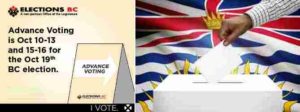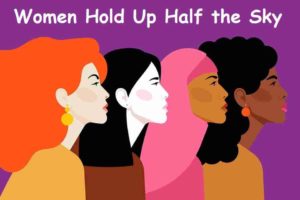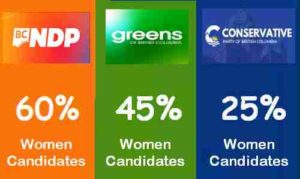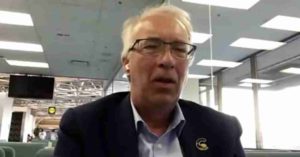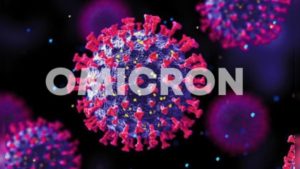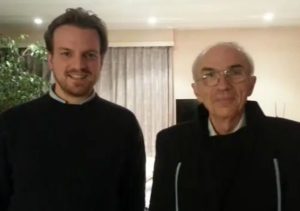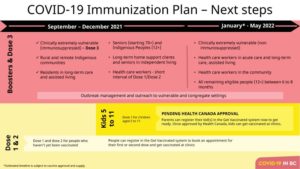
During the televised Leaders’ Debate on Tuesday evening, John Rustad, the leader of the B.C. Conservative Party, attempted to position himself as anti-mandate rather than anti-vaccine in the ongoing discourse about COVID-19 policies.
Mr. Rustad asserted that while he is not opposed to vaccinations in principle, he stands firmly against mandates that require health care professionals to be vaccinated, especially when working with vulnerable populations such as seniors in long-term care facilities and patients in hospitals.
But this nuanced distinction between being anti-mandate and anti-vaxx quickly breaks down when scrutinized, particularly given the public health consensus around vaccine mandates during the pandemic.
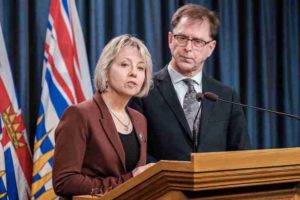
British Columbia Provincial Health Officer Dr. Bonnie Henry, and B.C. Health Minister Adrian Dix
In British Columbia, the provincial health officer, Dr. Bonnie Henry, and Health Minister Adrian Dix of the BC NDP, implemented vaccine mandates for health care workers as a necessary measure to protect vulnerable patients.
This policy was widely supported by the public, particularly as it served to reduce outbreaks in high-risk settings like hospitals and long-term care facilities, where the most vulnerable to COVID-19 reside.
Mr. Rustad’s disagreement with this policy, while couched as a defense of personal choice and bodily autonomy, ignores the broader responsibility that health care workers have to protect those in their care. By focusing on the rights of individuals over the collective health of the population, Mr. Rustad aligns himself with sentiments that fueled the anti-vaccine movement during the pandemic.
Despite Mr. Rustad’s assertions, it is difficult to see the leader of the B.C. Conservatives as anything other than an anti-vaxx candidate for Premier.
Mr. Rustad’s opposition to mandates undermines the importance of vaccinations, particularly in settings where immunity is critical to safeguarding public health.

John Rustad’s participation in, and support for, the 2022 Freedom Convoy further cements this image. The Convoy, which protested vaccine mandates and public health restrictions, drew significant attention and controversy. Its leadership, including figures like Tamara Lich and Pat King, was tied to far-right groups such as The Proud Boys, and its movement was largely fueled by misinformation and conspiracy theories about vaccines and COVID-19.
Mr. Rustad’s vocal support for the Convoy and his appearance at related events signal his alignment with an anti-vaccine, anti-government fringe that many voters in British Columbia see as harmful and out of touch with mainstream values.
Moreover, Mr. Rustad’s association with the “Nuremberg 2.0” movement — a group that seeks to hold politicians, public health officials, and healthcare workers accountable for enforcing vaccine mandates, sometimes calling for extreme measures such as execution — adds to the troubling picture of his stance on vaccines.
While Mr. Rustad has attempted to distance himself from these more extreme elements, his previous support for “Nuremberg 2.0” cannot be easily disavowed.
The BCPS Employees for Freedom Society interview with B.C. Conservative Party leader John Rustad (you have to skip the first video that loads) who states that if he is elected Premier, he would replace Dr. Henry, and further would compensate with government funds health care professionals who he believes were discriminated against and mistreated under the “regime” of Dr. Bonnie Henry.
John Rustad’s participation in this discourse, as may be heard in the video above, suggests that he is sympathetic to radical ideas about government overreach and personal liberty, which alienates the broader electorate, particularly those who understand the critical importance of public health measures during a pandemic.
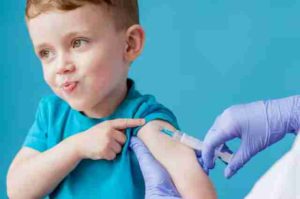
Perhaps more alarming than Mr. Rustad’s stance on COVID-19 vaccines is the wider impact that anti-vaxx sentiments have had on childhood vaccinations.
The anti-vaccine movement, amplified during the pandemic, has contributed to a troubling rise in vaccine skepticism among parents.
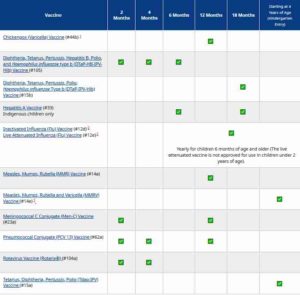
All of the shots responsible parents must ensure their children receive in the first 18 months of their child’s life, in order to keep their child, and all children their child associates with safe.
Diseases such as measles, mumps, rubella, polio, and whooping cough, which were once nearly eradicated in developed countries due to widespread immunization, are now re-emerging as fewer parents vaccinate their children.
As per the graphic above — the B.C. Immunization Schedule published by British Columbia’s Ministry of Health — in Canada, children must receive a range of vaccinations before they reach 18 months of age to protect them from these serious and often deadly illnesses.
As may be seen above, a standard schedule of immunizations includes the MMR (measles, mumps, rubella) vaccine, polio, DTaP (diphtheria, tetanus, and whooping cough), hepatitis B, and rotavirus vaccines, among others.
The erosion of trust in vaccines, driven by movements like the one John Rustad has supported, puts entire communities at risk.
Without sufficient levels of immunization, herd immunity is weakened, meaning even vaccinated children are at greater risk of contracting preventable diseases. The result: rising cases of measles and polio, diseases once relegated to history, but now on the rise once again, causing concern to communities across Canada.
Electing a candidate like Conservative Party of British Columbia leader John Rustad as Premier, a candidate for our province’s highest office, a candidate who flirts with anti-vaxx ideologies and rejects mandates that protect public health, could and would have far-reaching, negative consequences for British Columbians.
John Rustad’s dangerous anti-science views on the efficacy of vaccines undermine confidence in both the healthcare system and public health policies that have kept communities safe from pandemics and other infectious diseases.
A John Rustad-led government might, and most probably would, roll back critical protections, emboldening the anti-vaxx movement, leading to lower vaccination rates for not just COVID-19 but other essential vaccines as well.
Conservative Party of B.C. policies would exacerbate the resurgence of preventable diseases, putting the health of British Columbians — especially vulnerable populations such as children, the elderly, and the immunocompromised — at risk.
Later this month, the latest Health Canada approved COVID-19 vaccine will be made available to the health ministries in provinces across Canada.
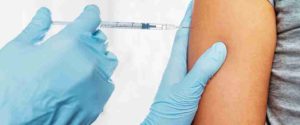
B.C. NDP Premier David Eby, as well as B.C. Green Party leader, Sonia Furstenau, have been explicit in stating that the fully funded availability of the latest mRNA vaccine is mandatory, as the province prepares for the rollout of both the latest COVID-19 mRNA vaccine, and the updated flu shot.
How about John Rustad?
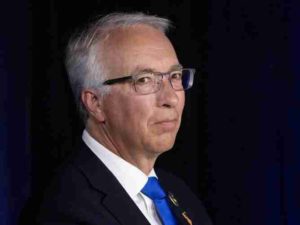
Given John Rustad’s skepticism about the efficacy of the COVID-19 vaccine, would a John Rustad-led government purchase the necessary tranch of COVID-19 vaccines, or would vulnerable British Columbians be left to their own devices, and responsible themselves for the purchase of the potentially life-saving COVID-19 vaccine?
B.C. Conservative Party leader John Rustad’s rhetoric and actions align him more with anti-vaccine extremism than with a legitimate concern for personal freedom.
John Rustad’s rejection of mandates, support for radical movements like the Freedom Convoy, and ties to anti-vaxx conspiracies reflect a dangerous undercurrent in his politics many voters in British Columbia will hopefully find disqualifying.
